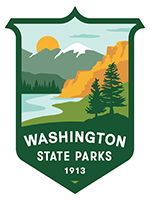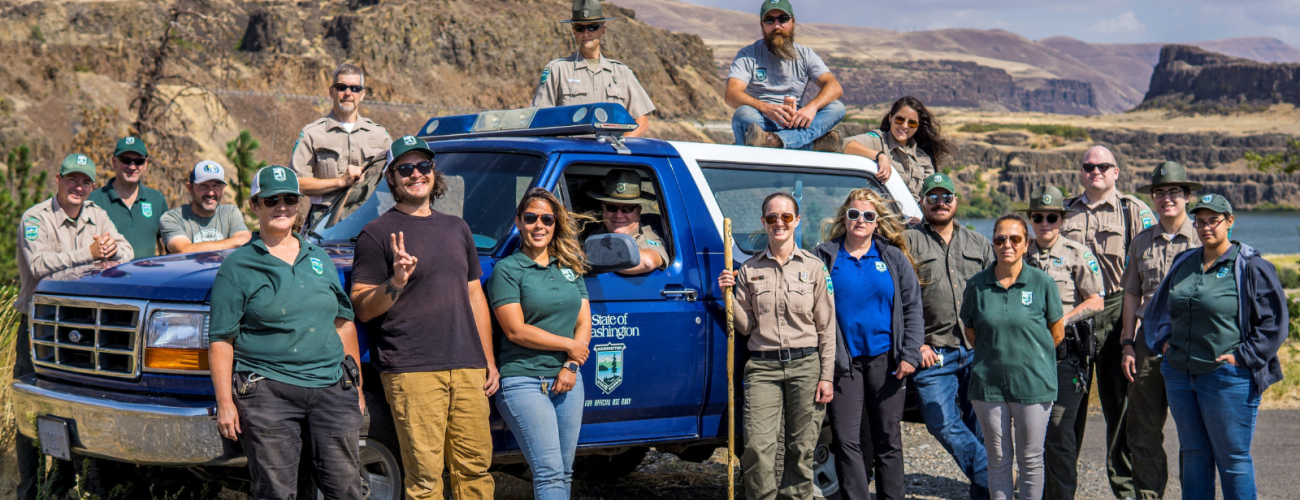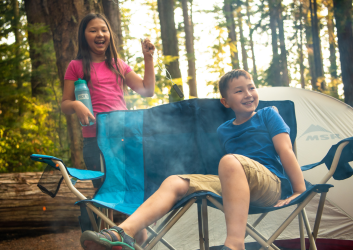Who's who at Washington State Parks
From park rangers to camp hosts, here’s who can help you enjoy your state park visit
Our in-park staff are excited to welcome you to Washington’s state parks. Whether you’re picnicking for the day, camping for a week or just passing through, there are staff available to help you.
Before you head out, here’s a little bit about the who’s who of staff in our parks.
Park hosts
Who they are: Park hosts are volunteers who stay in designated campsites, in their own RV or camper – or on their boat docked at a marine state park. Hosts are an invaluable part of our team.
What they wear: Find them in green Volunteer vests with a name badge on the front.
Park hosts:
- Provide information about park activities – from programs and concerts to equipment rentals
- Help you find your campsite
- Share park rules and regulations
- Sell firewood
- Recommend area activities and amenities
- Connect you with staff for specific needs or concerns
- Call 911 and/or law enforcement in emergencies
- Care for the grounds, including cleaning campsites, gardening and mowing
- Assist in the park office or with interpretive programming
Park hosts don’t:
- Enforce rules
- Act as first responders
- Work full time
Camp hosts work a minimum of 28 hours a week. When their “off-duty” sign is up, please respect their privacy, except in emergencies.
If hosting sounds like your dream many of our state parks need hosts in summer.
Park aides
Park aides are critical to keeping parks clean, green and welcoming.
Who they are: Park aides are seasonal employees, usually working spring to fall, though some also work in the winter. Many return to work with us for several seasons.
What they wear: They’ll be dressed in State Parks polos or t-shirts.
Park aides:
- Mow and pull weeds
- Clear campsites
- Clean and restock restrooms
- Work in the park office or Welcome Booth assisting with campsite registration and Discover Pass sales
- Assist with facility maintenance
- Orient you within the park
- Discuss rules, regulations, quiet hours and open office hours
- Connect you with appropriate staff for specific needs or concerns
- Call 911 in an emergency
Park aides don’t:
- Enforce rules
- Handle first responder duties
- Make major repairs, including plumbing and electrical
If you or someone you know is interested in becoming a park aide, check the State of Washington careers site for job postings.
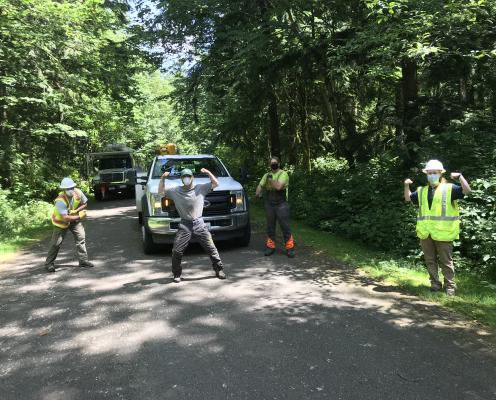
Construction and Maintenance (C&M) staff
Our trusty C&M staff handles facility maintenance and major repairs.
Who they are: These indispensable teammates are mechanics, plumbers, electricians, carpenters and tradespeople whose skills keep park infrastructure in shape.
What they wear: They’ll be wearing State Parks t-shirts or polos and safety gear, depending on the project.
C&M specialists and maintenance mechanics:
- Install, maintain and repair trail signs
- Repair major trail damage
- Fix plumbing and electrical issues
- Manage our water and sewer systems
- Fix and maintain park equipment
- Repair park docks, piers and boardwalks
- Remove hazard trees with our regional arbor crews
- Connect you with a ranger if needed
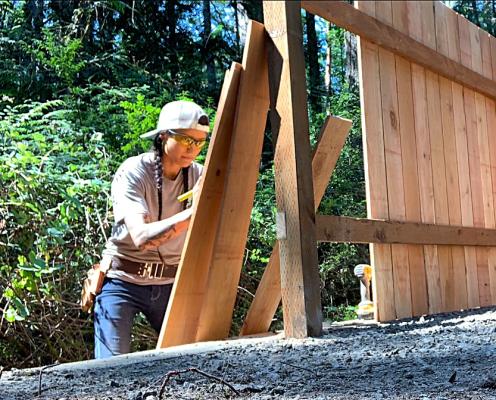
C&M staff don’t:
- Typically answer park questions, but they can direct you to someone who can
- Sell Discover Passes
- Enforce rules
Administrative staff
Who they are: Our friendly administrative staff work in park offices and Welcome Booths.
What they wear: Regular civilian clothes, sometimes with Park emblems, but not always.
Admin staff:
- Sell Discover Passes
- Help you check in and find your campsite
- Help you find firewood for sale
- Suggest things to do in and outside the park
- Sell and coordinate special activity permits
- Help alert customers and manage emergencies
Admin staff don’t:
- Enforce rules
- Do maintenance and repairs
- Handle first responder duties
If you need help and don’t see staff in the campground or picnic area, try the office or Welcome Booth during business hours.
Park rangers
Who they are: When you think of State Parks staff, you probably envision a park ranger. Rangers educate, protect, preserve and enhance our parks.
What they wear: Rangers wear uniforms that may include the typical ranger’s “flat hat,” along with a badge.
Rangers:
- Assist or lead interpretive and school programs, evening talks and guided walks
- Educate visitors about the park and park rules
- Promote a safe, respectful environment for visitors and staff
- Direct traffic and crowd control
- De-escalate conflicts
- Give citations for infractions in the park
- Perform searches, rescues and recoveries
- Handle emergencies
Learn more about park rangers.
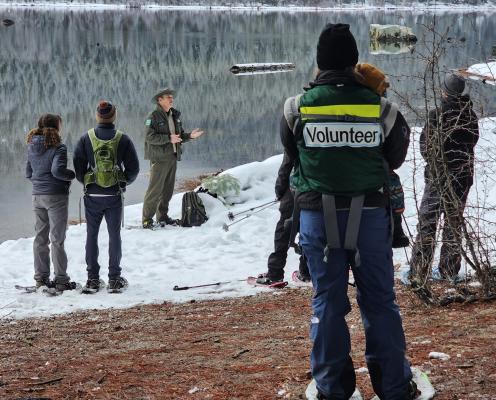
Interpretive specialists
Interpretive specialists are well-versed in everything from human and natural history to plant and animal life in their park. Their storytelling methods engage visitors of all ages and backgrounds.
Who they are: Many State Parks interpreters have science, history or museum management backgrounds. They thrive on creativity and community engagement.
What they wear: They wear similar uniforms to rangers, with the designation “Interpretive” on the arm.
Interpretive specialists:
- Research their parks’ histories and unique features
- Develop and run themed tours
- Create educational signage and presentations
- Train beach naturalists and living history volunteers
- Organize events with Friends groups
- Educate visitors on park rules
- Staff interpretive centers
- Host pop-up tables showcasing park history, botany, geology or animal life
- Assist kids with Junior Ranger programs
- Participate in community fairs, library or school programs
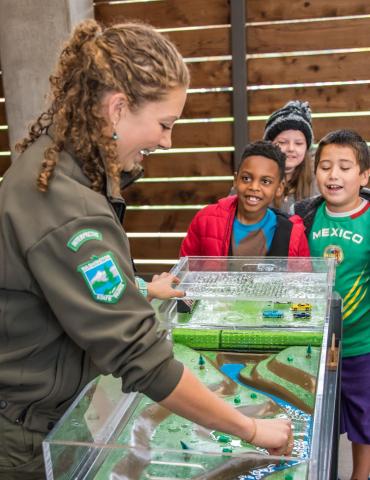
Interpretive specialists don’t:
- Enforce park rules
- Do maintenance and repair
- Act as first responders
- Interpret in foreign languages or ASL (though some are multilingual or use ASL)
What if I can’t find a staff member?
Some state parks are remote, and staff cover several parks over many miles. Other parks are big, and you may not see staff unless you look for them.
In camping parks, you’ll probably find staff or hosts in campgrounds, offices and Welcome Booths. An after-hours phone number will be posted when the booth and office are closed.
In an emergency, call 911 first.
Additional support
The Information Center, located in our Headquarters Building in Lacey, can also provide you support when you need it. They're available 8 a.m.- 5 p.m., Mon-Fri. to answer questions about state parks, up-to-date information about park features, amenities and seasonal activities. Give them a call at (360) 902-8844 or email them at Infocent@parks.wa.gov.
Originally published July 09, 2025
